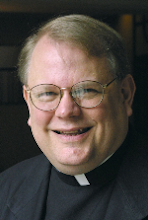
Thanksgiving
Homily
We come here, on this Thanksgiving Day, to offer the Holy Eucharist... comes from the Latin Eucharistia, which comes from the Greek Eucharistein, which comes from the Hebrew Berakah.
Berakah is a funny word in Hebrew. It means thanksgiving, but it always requires two actions: to remember the great works God has done for us and, second, that we bless him for his goodness to us. Its like the ancient Berkahs which served as a model for the prayers the Bishop will pray in just a few moments at the preparation of the Gfts: Barukh Attah Adonai Eloheinu Melekh ha-Olam = Blessed are you, Lord our God, King of the Universe.
So to give thanks we must do two things: remember and bless.
We should, therefore, do everything we can to remember the mercies of God.
Now, it's not that we're really that bad at remembering. In fact we're really quite good at remembering everything that went bad this past year. The promotion you didn't get, the diagnosis you didn't want, the ice storm that caused that accident with the car, and all the manifold ways in which we are sometimes convinced that God sits up like some sadistic patriarch trying to make us miserable. No, we're quite good at remembering.
But we're not so good at remembering his mercies, and his bountiful gifts to us.
I was reminded of this last week, when I saw an old friend who had come to celebrate Confirmation with Bishop McManus last Sunday afternoon. When he entered the sacristy he was carrying a funny looking machine on his back, which processed oxygen and fed it to his weakened lungs through two plastic tubes in his nose. I expressed surprise and concern and he told me matter of factly, Oh, it’s not so bad. I need the machine for half the time now, soon it will be full time.
Counting My Blessings
For the rest of the afternoon, I I never stopped counting my breaths...these airy blessing which God gives me five times a minute. He made the air you breathe and formed the lungs you breathe with. He is the reason your heart beats and how the blood flows through your veins....your feelings and your fears, your joys and each of your hopes. He made it all. And when’s the last time I said "thank you" for that?
When’s the last time I remembered the deepest pleasure of a good nights sleep, or the wonder of the first deep breath of cold fresh air, the overwhelming colors of a maple tree in fall, or the awesome quiet of the new fallen snow, the indescribable beauty of a springtime blossom, or the soothing warmth of a summer’s breeze?
In stubborn foolishness, I refuse to remember his mercies, so how can I ever hope to give thanks?
And to really give thanks I need not only to remember, but to bless God for his infinite mercies! In other words, the only posture from which thanksgiving makes sense is on my knees in front of a cross. Only then do I know that I am little and God is big. Only then do I know that at the end of the day and at the beginning and at every moment in between he is in charge not me.
This is what brings us to this Thanksgiving day, and to this altar, where the great sacrifice of praise, the eucharistia is offered with us and on our behalf.
This is what brings us to join the sacrifices of our lives to the perfect sacrifice Christ, who rose triumphant from the tomb in the perfect Berakah: the perfect sacrifice of remembering and blessing.
A little more than a hundred years ago, not so very far from here, Emily Dickinson wrote a poem about a man who had died a year before: a man who, from the grave, saw for the first time all the blessings of the fields that surrounded him throughout his life. He speaks from the grave:
... I know I heard the Corn,
When I was carried by the Farms--
It had the Tassels on--
I thought how yellow it would look--
When Richard went to mill--
And then, I wanted to get out,
But something held my will.
I thought just how Red--Apples wedged
The Stubble's joints between--
And the Carts stooping round the fields
To take the Pumpkins in--
I wondered which would miss me, least,
And when Thanksgiving, came,
If Father'd multiply the plates--
To make an even Sum--
Need we wait until we’re dead to remember his mercies and to bless his name?
Need we wait? Or can we not bless him for all the myriad ways he has loved us and loves us still?
Monsignor James P. Moroney
Rector

